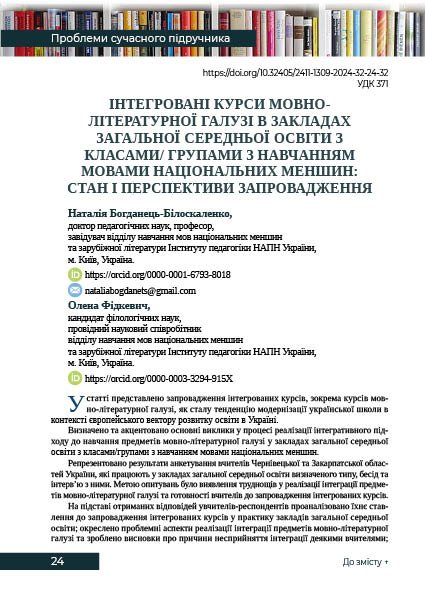INTEGRATED COURSES IN THE LANGUAGE AND LITERATURE FIELD IN GENERAL SECONDARY EDUCATION INSTITUTIONS WITH CLASSES/GROUPS WITH TEACHING IN NATIONAL MINORITY LANGUAGES: CURRENT STATUS AND IMPLEMENTATION PROSPECTS

Published 2024-08-06
Keywords
- modernization of the content of education,
- integrative approach,
- linguistic and literary field,
- institutions of general secondary education,
- languages and literature of national minorities
How to Cite

This work is licensed under a Creative Commons Attribution-NonCommercial-ShareAlike 4.0 International License.
Abstract
The article presents the introduction of integrated courses, in particular language and literature courses, as a permanent trend of Ukrainian school modernization in the context of the European vector of education development in Ukraine.
The main challenges in the process of implementing an integrative approach to the teaching of linguistic and literary subjects in institutions of general secondary education with classes/groups with teaching in national minority languages are identified and emphasized. The results of a questionnaire survey of teachers of the Chernivtsi and Zakarpattia regions of Ukraine who work in general secondary education institutions of a certain type, conversations and interviews with them are represented.
The purpose of the surveys was to identify difficulties in implementing the integration of language and literature subjects and teachers' readiness to introduce integrated courses.
On the basis of the received answers of the respondent teachers, their attitude to the introduction of integrated courses into the practice of general secondary education institutions was analyzed; problematic aspects of the implementation of the integration of language and literature subjects are outlined and conclusions are made about the reasons for the non-acceptance of integration by some teachers; ways of increasing the effectiveness of the implementation of an integrative approach to teaching languages and literatures have been thought out.
Directions for further research into the process of introducing an integrative approach to the teaching of linguistic and literary subjects are proposed, in particular in institutions of general secondary education with classes/groups with teaching in national minority languages.
Downloads
References
- Державний стандарт базової середньої освіти. (2020). https://www.kmu.gov.ua/npas/pro-deyaki-pitannya-derzhavnih-standartiv-povnoyi-zagalnoyi-serednoyi-osviti-i300920-898
- Модельні навчальні програми для 5‒9 класів Нової української школи. (2022a). Мовно-літературна галузь. Інтегровані курси. https://mon.gov.ua/osvita-2/zagalna-serednya-osvita/osvitni-programi
- Модельні навчальні програми для 5‒9 класів Нової української школи. (2022b). Мовно-літературна галузь. Модельні навчальні програми з мов та літератур корінних народів і національних меншин. https://mon.gov.ua/osvita-2/zagalna-serednya-osvita/osvitni-programi
- Нічишина, В. (2014). Про науково-теоретичні засади підвищення ефективності професійної підготовки майбутніх учителів на основі інтегративного підходу. Наукові записки Кіровоградського державного педагогічного університету імені Володимира Винниченка. Серія: Педагогічні науки, 134, 178‒182.
- Яценко, Т.О., Тригуб, І.А. (2023). Особливості вивчення інтегрованого курсу літератур (української та зарубіжної) у 5–6 класах Нової української школи. Загальна середня освіта України в умовах воєнного стану та відбудови: реалії, досвід, перспективи. Методичний порадник науковців Інституту педагогіки НАПН України до початку нового 2023–2024 навчального року: методичні рекомендації. Київ: Педагогічна думка.
- Derzhavnyi standart bazovoi serednoi osvity. (2020). https://www.kmu.gov.ua/npas/pro-deyaki-pitannya-derzhavnih-standartiv-povnoyi-zagalnoyi-serednoyi-osviti-i300920-898 (in Ukrainian).
- Modelni navchalni prohramy dlia 5‒9 klasiv Novoi ukrainskoi shkoly. (2022a). Movno-literaturna haluz. Intehrovani kursy. https://mon.gov.ua/osvita-2/zagalna-serednya-osvita/osvitni-programi (in Ukrainian).
- Modelni navchalni prohramy dlia 5‒9 klasiv Novoi ukrainskoi shkoly. (2022b). Movno-literaturna haluz. Modelni navchalni prohramy z mov ta literatur korinnykh narodiv i natsionalnykh menshyn. https://mon.gov.ua/osvita-2/zagalna-serednya-osvita/osvitni-programi (in Ukrainian).
- Nichyshyna, V. (2014). Pro naukovo-teoretychni zasady pidvyshchennia efektyvnosti profesiinoi pidhotovky maibutnikh uchyteliv na osnovi intehratyvnoho pidkhodu. Naukovi zapysky Kirovohradskoho derzhavnoho pedahohichnoho universytetu imeni Volodymyra Vynnychenka. Seriia: Pedahohichni nauky, 134, 178‒182. (in Ukrainian).
- Yatsenko, T.O., Tryhub, I.A. (2023). Osoblyvosti vyvchennia intehrovanoho kursu literatur (ukrainskoi ta zarubizhnoi) u 5–6 klasakh Novoi ukrainskoi shkoly. Zahalna serednia osvita Ukrainy v umovakh voiennoho stanu ta vidbudovy: realii, dosvid, perspektyvy. Metodychnyi poradnyk naukovtsiv Instytutu pedahohiky NAPN Ukrainy do pochatku novoho 2023–2024 navchalnoho roku: metodychni rekomendatsii. Kyiv: Pedahohichna dumka. (in Ukrainian).
